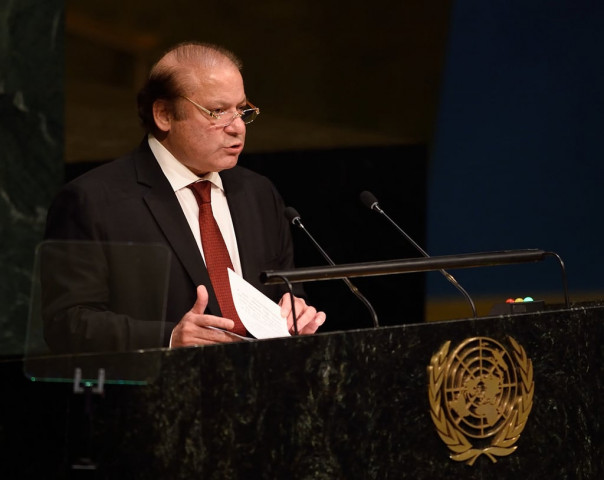The four-point bundle
Never a public speaker of renown, this was one of the prime minister’s more assured public performances

Prime Minister Nawaz Sharif addresses the 70th session of the United Nations General Assembly September 30, 2015 at the United Nations in New York.
All of the four items have featured somewhere in the prime minister’s public statements since he was re-elected in 2013, but never all in the same place at the same time. The four points are — a formalisation of the 2003 ceasefire along the Line of Control in Kashmir, a reaffirmation that neither country will be the first to use force, the demilitarisation of Kashmir and fourthly, a mutual withdrawal from the Siachen glacier battlefield. The first three are of boundless complexity, the fourth perhaps the most ‘do-able’ of the quartet, and possible to accomplish with no loss of face by either side. Given that not one of the many areas of friction and conflict that exist between India and Pakistan has ever come even close to resolution since Partition, the chances of the bundle becoming a peace package are slim. This is further reinforced by the response of the Indian Foreign Office spokesperson to the speech, accusing Pakistan of being the “prime sponsor” of terrorism. While the Indian response shows that our neighbour is not interested in resuming dialogue any time soon, this is no reason not to have the prime minister state what he did within the global apex body representing the international community. He has been consistent in his approach to India in this tenure and that is to the credit of his government. India has moved sharply to the nationalist right since the election of Narendra Modi and appears even less inclined peace-wards than it ever was. Our differences are the single greatest impediment to regional growth and development, and their resolution is in the interest of billions of people.
Published in The Express Tribune, October 2nd, 2015.
Like Opinion & Editorial on Facebook, follow @ETOpEd on Twitter to receive all updates on all our daily pieces.















COMMENTS
Comments are moderated and generally will be posted if they are on-topic and not abusive.
For more information, please see our Comments FAQ